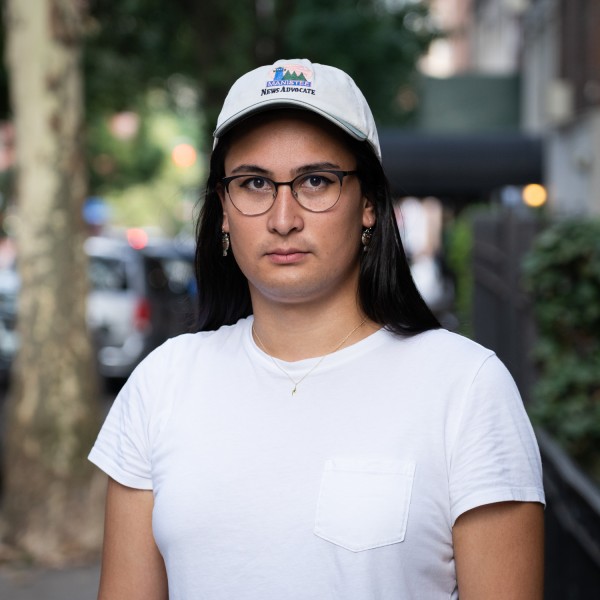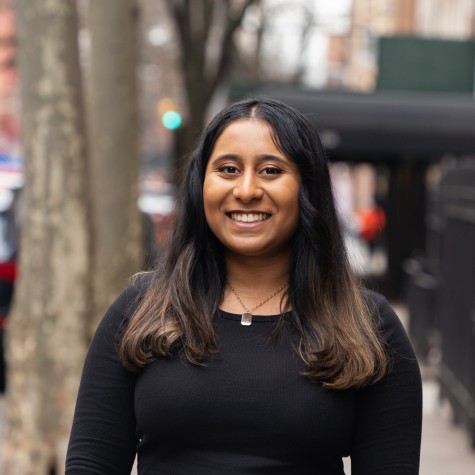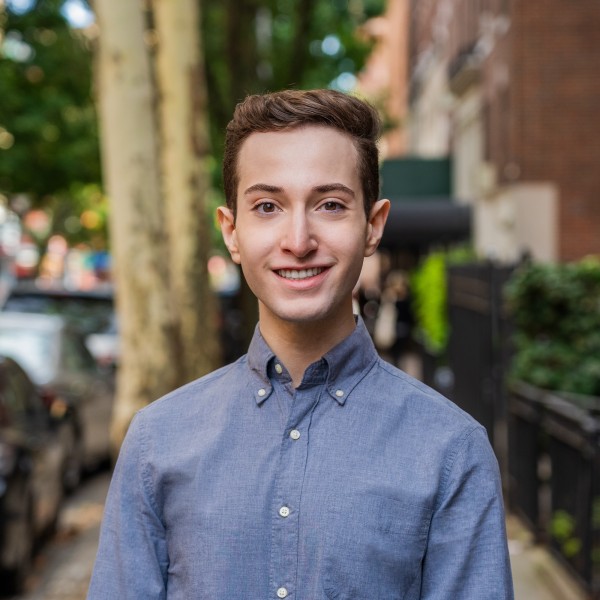Hi everyone!
Welcome back to Editor’s Note. This week, I spoke to a handful of our staff to discuss how WSN covers major — but distant — world events like the Russian invasion of Ukraine.
I also want to mention up here that the ability to customize your WSN newsletter subscriptions is Coming Soon™. We’re working on it. I promise.
Now on to this week’s top stories.
|
|

|
|
More than 400 members of the NYU community convened at the steps of the Kimmel Center for University Life to participate in a vigil for Ukraine. (Photo by Joshua Becker)
|
|
A vigil for Ukraine at NYU’s Kimmel Center drew over 400 attendees on Monday. Last weekend, protesters gathered at locations across the city to denounce Russia’s invasion and show support for Ukrainians.
After a string of attacks on campus — and as a suspect was arrested following a similar string of anti-Asian attacks — NYU Campus Safety made plans to improve security on campus.
NYU president Andy Hamilton and other administrators discussed mask wearing, Ukraine and student safety at a virtual town hall on Thursday.
On Ukraine: “As an institution, we stand ready to help our Ukrainian colleagues in Ukraine, our students and scholars from there, with financial support, with providing opportunities for them to continue their work at NYU,” Hamilton said.
On the indoor mask mandate: “We are inching towards lifting it, but we are just not quite there yet,” said Dr. Carlo Ciotoli, head of NYU’s COVID-19 Prevention & Response Team. He added that if the mandate is lifted, masks will still be recommended.
On campus safety concerns: “We have a campus safety organization who have a very difficult job to do,” Hamilton said, noting that NYU differs from many U.S. universities by not having its own armed police force.
The Astor Place Starbucks is the latest store in the coffeeshop chain where workers are seeking to unionize.
|
|

|
|
Tourists can make vacation destinations unsafe for the people who actually live there. NYU students from these locations share their thoughts on tropical tourism. (Staff Photo by Roshni Raj)
|
|
Here’s why some students who live near popular vacation destinations want you to rethink your spring break plans.
English singer-songwriter Maisie Peters spoke with WSN’s Holly Grace Jamili about drawing inspiration from literature, Britney Spears, her mentor Ed Sheeran and a Brooklyn vacation with her sister.
Hyping up veganism isn’t enough — Gabby Lozano writes that if Mayor Eric Adams really wants to improve New Yorkers’ health, he must address food insecurity.
Here are our recommendations for bottomless brunch near NYU. (“Have fun getting home,” Roshni Raj writes.)
|
|

|
|
On Feb. 18, Mayor Eric Adams announced a new subway safety plan that prioritizes the relocation of homeless individuals. (Staff Photo by Manasa Gudavalli)
|
|
This week’s house editorial criticizes Mayor Eric Adams’ treatment of unhoused people. (ICYMI, last week’s Editor’s Note explained changes to our house editorial structure.)
The continued existence of NYU’s Tel Aviv study away site condones apartheid in Israel, Trace Miller writes, citing a recent Amnesty International report and NYU’s connections with Tel Aviv University.
Extending the maximum length of TikToks to 10 minutes would enable the spread of misinformation, argues Alexandra Cohen — and that’s also just too long to watch.
|
|
I’ve recently fielded a couple questions from readers asking why we haven’t done more to cover the situation in Ukraine. To be honest, the first thing I think to myself when I get asked these questions is “what are we supposed to do?” The second is “what are we supposed to do?”
The easy answer would be to say that it’s not our problem — eastern Europe is a long way from New York University, and there’s no NYU Kyiv, after all. But despite the geographic distance, the war is emotionally very near for many at NYU, especially for those from the affected areas or with family living nearby. It would be irresponsible of us to pretend like the Russian invasion wasn’t affecting our community.
That doesn’t make it make any more sense for us to write directly about events on the ground in Ukraine, though. We don’t have any reporters there, and repeating others’ work to show that we care isn’t really journalism.
With this in mind, our general approach is to cover how distant events affect our local audience. In this case, that means writing about university administrators’ responses, citywide protests and a vigil at NYU (which we also mentioned in the Daybook, our weekly events column).
We also have the Soapbox, a weekly column that collates global coverage of world news events to present our readers with themes and trends. The most recent installment opened with a section about reports of racial discrimination from people fleeing Ukraine, and the one before that recapped early reports on the Russian invasion.
What we’re trying to do is strike a balance — we don’t want to ignore world events, but we also don’t want to simply repeat the same news you could get from a major publication.
It’s not just my decision to make, though. Here’s what some of our staff at and around our news department have to say about how WSN handles world news.
Trace Miller
Managing Editor
spring 2021 News Editor
It should come down to what we can report originally versus what we're reporting from secondary sources. It's like, what do we have the resources to cover? And what do we have the interest to cover? It's a matter of finding something that we both can report on originally and something that is worth reporting on originally, in the sense that it relates to our audience.
Rachel Fadem
Features Editor
fall 2021 Deputy News Editor
We don't want to just repeat the news that other publications are doing — we want to have a unique perspective. I think our strength at the Washington Square News is finding that NYU or local Greenwich Village, East Village-area hook. However, I don't think that our coverage is going to look the same as CNN or NBC. I think that we have different strengths that can focus on student voices.
Rachel Cohen
News Editor
fall 2021 Deputy News Editor
We don't have resources like other publications to stay on top of everything, but I think we've been trying our best to somehow find a connection with bigger issues to the students. With Russia and Ukraine, we’ve covered New York City protests, we've covered the vigil at NYU, and we're doing everything we can to include perspectives from Russian and Ukrainian students. But it's difficult at times because we don't have enough resources to be able to cover an international story.
Arnav Binaykia
Deputy Managing Editor
fall 2021 News Editor
I do not believe we have the resources to responsibly report on these stories. Responsibly reporting on these stories would include independently verifying sources, fact-checking, and making sure that the information we present is up to date. For something like the Ukraine story, that is difficult to do responsibly.
Whenever we do these stories, it's like either rehashing what other people have written about it, has a bunch of links like the Soapbox, or it’s like 10 days after the story actually happened. Our audience wants to read about Ukraine. It’s just — do they want to read about Ukraine from us?
Kristian Burt
News Editor
fall 2021 Deputy News Editor
With any big international politics occurrences happening, it's hard for us to have a story that's going to go really in depth into the history and every single part of an international news topic when we have to connect it to a student perspective or a university perspective.
That's kind of why WSN is WSN, because we can look back on the records 10 years from now and be like, “Look at these student protests that were going on,” like, “Look at this huge 400-person vigil that happened.” It'd be weird to look back on the records and be like, “Oh look, Russia invaded Ukraine…” That’s not the record we’re trying to keep.
What record do you think WSN should keep? How do you feel about how we’ve been covering recent events? Is there anything else you’d like to hear our staff’s thoughts on?
Reach out to us on our socials — @nyunews on Twitter, Instagram and Facebook — or contact me directly at the email down below.
Thanks for reading Editor’s Note. Until next week,
—the editor
|
|
|
|



